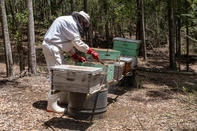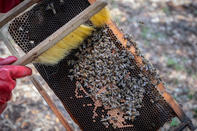Keeping bees can be an exciting outdoor hobby, but may also grow into a full-time commercial business. The commercial beekeeper will be able to supply pollination services and produce bee-related products such as honey, propolis and wax and may be able to teach and mentor new beekeepers.

Beekeeping is, however, hard work but will reward even the smallest hobby beekeeper with honey. The South African Bee Industry Organisation (SABIO) differentiate between hobby beekeepers (with one to 100 beehives) and commercial beekeepers who manage from 800 to 10 000 beehives. Smallholder or developmental beekeepers may have 10 to 150 beehives.
These are often kept and managed in co-operative bodies or as community development projects. Before starting beekeeping consider this: keeping bees is the same as managing animals - you need to look after them, make sure they are healthy and safe, have food, water and that there is space for expansion. Also, beekeeping can be heavy work.
You will need to handle heavy hives full of honey and moving bees from apiary to apiary for pollination. During summer, you will need to inspect hives weekly - to determine if the colony has young queens, enough space for expanding its brood and to check for any diseases.
Things Needed for Beekeeping

When starting up as a beekeeper, you will generally need four things: You will need to learn about bees and beekeeping. The first is a basic understanding of how a bee swarm (called a ‘colony’) is structured. You will also need to know about the physiology of the bee, bee diseases, the tasks of the different bees in the hive and how the honeybee forages (gathers food) in nature.
The second thing a new bee farmer needs is a site to put the first beehive. This can be an orchard, grove of trees (e.g. eucalyptus) or a field of flowering plants (e.g. onions). Thirdly the new bee farmer will need a beehive and colony of bees. A good beehive will be easy to handle, will keep bees safe and provide a place to build their honeycombs and raise their young.
Lastly it is important to have proper clothing (to limit bee stings) and some basic beekeeping tools. Make sure you are not allergic to bee stings. Remember, often an allergic reaction does not show with the first sting, allergies may only start to manifest after repeated stings. Speak to your doctor to keep the correct medication handy.
All beekeepers need to register with the Department of Agriculture, Forestry and Fisheries (DAFF). Registration takes place between 1 January and 31 March and is free of charge. Search DAFF for the ‘beekeepers registration form’.
By Marinda Louw